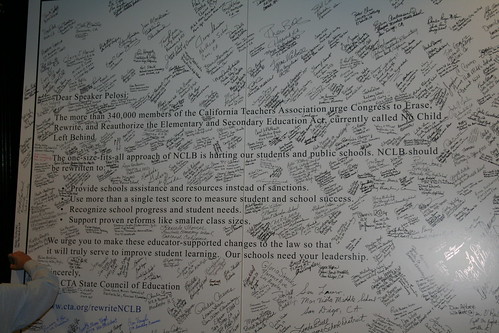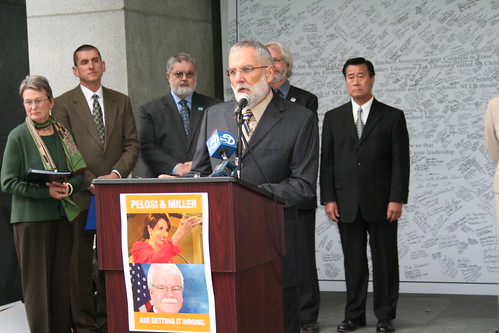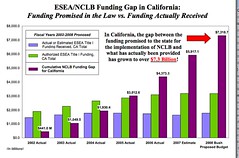The Northern Solano Democratic Club has posted five resolutions on their web site that will be submitted for approval at the state convention next month.
They are:
A Resolution for Improving Higher Education Accreditation Practices
A Resolution for Relief from No Child Left Behind Expenditures
A Resolution Opposing the Open Primary in 2010
A Resolution for majority Rule Initiative Reducing the Threshold for Passing a State Budget
A Resolution on Contesting Elections
The full text of each is below the fold and can be adopted by local clubs by inserting your club name in the “Resolved” clauses at the appropriate place.
A Resolution for Improving Higher Education Accreditation Practices
WHEREAS, under the previous administration, the Department of Education has asserted that the accrediting agencies for higher education have failed in their duties and has consequently demanded that accrediting agencies assert themselves and take action against our community colleges, and
WHEREAS, notwithstanding the fact that real and important issues do exist for our community colleges and those issues need to be resolved, it is a fact that the accrediting agency in California has acted capriciously and has issued negative findings that too often are not related to educational issues but to trivial matters that lack sufficient import to be cited as a reasons for withdrawing accreditation, and
WHEREAS the negative findings of the accreditation agency in California seem to follow a pattern that gives the appearance of selective findings repeatedly invoked in support of a predetermined outcome rather than the findings of an honest inquiry,
THEREFORE, BE IT RESOLVED that [insert the name of your club here] proposes that the accreditation agencies for higher education be instructed that the time frame for compliance, currently set at two years, be defined as commencing when the educational institution receives a set of clearly stated accreditation issues to be resolved along with clearly defined criteria for the resolution of those issues,
AND, BE IT FURTHER RESOLVED that [insert the name of your club here] calls upon the California Democratic Delegations to the United States Senate and House of Representatives to bring their combined influence to bear on the higher education accreditation process so that it might function in a proper manner.
A Resolution for Relief from No Child Left Behind Expenditures
WHEREAS, the California State budget reduces education funding by 7.4 Billion dollars this year and the Federal Stimulus money allotted to California to stabilize educational funding amounts to only 6 Billion dollars, leaving a deficit of 1.4 Billion dollars , and
WHEREAS the common consensus is that the sanctions imposed by No Child Left Behind (NCLB) have failed to produce positive results, and
WHEREAS it is well known that NCLB imposes requirements on schools districts and demands actions from those districts while providing no funding for those mandates, there has been no public focus on the fact that the cost to implement programs designed to bring under performing groups up to NCLB compliant standards have been estimated to be Thousands of Dollars Per Student and would require massive increases in funding,
THEREFORE, BE IT RESOLVED that in these financially difficult times, with our public schools in dreadful financial straits, the [insert the name of your club here] recognizes that it is unconscionable to require our schools to continue funding NCLB compliance activities, and, for this reason, [insert the name of your club here] proposes that public schools be given relief from the mandates of NCLB for the period of one year, and
BE IT FURTHER RESOLVED that the [insert the name of your club here] calls upon the California Democratic Delegations to the United States Senate and House of Representatives to introduce and to work for the passage of legislation that will suspend, for one year, all NCLB compliance activities that require the expenditure of local school or district funds.
A Resolution Opposing the Open Primary in 2010
WHEREAS passage of Senate Constitutional Amendment 4, not only lacks legitimacy, but also encourages the minority party to commit acts of political blackmail and extortion in the future, and
WHEREAS it is a fundamental right of political parties to choose their nominees for office in accordance with the constitutionally protected right of Freedom of Association, and further, the open primary clearly violates that right by forcing political parties to admit nonmembers into the nominating process and thus enabling the election of candidates who do not support their party’s philosophy or platform, and
WHEREAS the proposed open primary will increase campaign spending, strengthen the influence of special interests, weaken party cohesiveness, and expand the opportunity for manipulative and deceitful electoral practices such as concealing party affiliation, the running of stalking horse candidates, and the gaming of results through organized crossover voting,
THEREFORE, BE IT RESOLVED that [insert the name of your club here] opposes approval of Senate Constitutional Amendment Four, and
BE IT FURTHER RESOLVED that [insert the name of your club here] calls upon all members of the California Democratic Party, especially our elected officials, to campaign to defeat the measure at the polls.
A Resolution for Majority Rule Initiative Reducing the Threshold for Passing a State Budget
WHEREAS the State of California has adopted a budget that neither fulfills the needs of the people of California nor reflects the values of a majority of the people and their representatives in the state legislature and,
WHEREAS the approval of the state budget was inexcusably delayed in the State Senate for more than seven months by a few members who chose loyalty to ideology over a commitment to common sense, the good of the State, and the needs of their constituents, and
WHEREAS this inexcusable travesty was due solely to the current state constitutional requirement that two-thirds of the members of the state legislature are required to approve a budget,
THEREFORE, BE IT RESOLVED that [insert the name of your club here] supports lowering the threshold for passing the state budget to 50-percent-plus-one, and
BE IT FURTHER RESOLVED that [insert the name of your club here] calls upon all members of the California Democratic Party, especially our elected officials, to campaign actively for the adoption of the 50-percent-plus-one threshold for budget passage.
A Resolution on Contesting Elections
WHEREAS State Senator Abel Maldonado, the leading hold-out in the budget impasse, was reelected without a Democratic opponent in 2008, and his seat was one of six Congressional, State Senate, and Assembly district seats that were uncontested by Democratic candidates, and
WHEREAS it gives the appearance of “back room deal making” when Republican held districts remain unchallenged, as has occurred on more than one occasion, and
WHEREAS it is un-American to discourage any qualified citizen from seeking elected office and irresponsible of Democratic leaders to let any seat go uncontested,
THEREFORE, BE IT RESOLVED that [insert the name of your club here] strongly condemns any and all efforts, past, present, or future, to discourage Democratic candidates from challenging Republican incumbents, and
BE IT FURTHER RESOLVED that [insert the name of your club here] demands that no Democratic Party member or elected official ever discourage a qualified Democrat from seeking elected office and insists that the California Democratic Party vigorously contest every office by recruiting and supporting qualified Democratic candidates.






